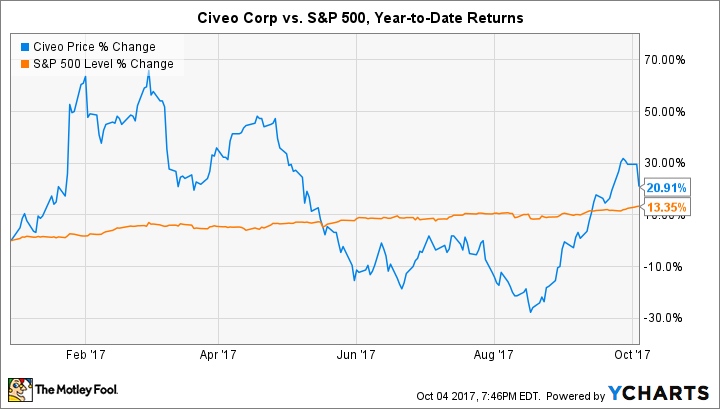Even the most successful investors swing and miss from time to time. It's a big, messy world out there, and no one has all the information they need to scout out only winning stocks for their portfolios. All individual investors can easily relate.
That said, it's probably best to steer clear of investing opportunities that sport a high degree of risk and low chance of success, especially when there's a pile of evidence pointing to that. Ziopharm Oncology (TCRT 4.25%), Civeo Corp (CVEO 1.45%), and Intrepid Potash (IPI 4.39%) each offer investors the promise of growth and above-average returns in the future, but I think it's more likely they could lose you a lot of money.

Image source: Getty Images.
Completely dependent on a single partner
Ziopharm has quite the enthusiastic group of followers. The biopharma stock was nearly left for dead in early 2013 when its drug platform at the time was essentially declared a failure, but has clawed its way back to life by focusing on new oncology drugs.
That's all well and good, but the company is entirely dependent on technology licensed from synthetic biology conglomerate Intrexon. The dependency is mutual. In fact, Ziopharm accounted for nearly 20% of its partner's total revenue in the first half of 2017.
Here's the thing: Exactly zero of the seven Intrexon technologies listed on Ziopharm's website have a track record to brag about. That wouldn't be so bad if they were new and novel, but all except one (ActoBiotics) are quite old and were gobbled up at bargain basement prices for the simple reason that were thought to be next to worthless. Repackaging them with shiny new slides and marketing graphics doesn't change that.
The way to view the partnership is one of mutual convenience, not one that will change the world or even has a decent shot at success. Ziopharm needed something to pivot to in order to keep the lights on post-2013. Intrexon is waiting to commercialize several products it hopes can generate meaningful revenue, but doesn't want to evaporate shareholder capital in the years that will take, so it collects rent from small- and micro-cap partners on worthless technology.
By the time Ziopharm's pipeline is exposed for what it is, Intrexon will no longer have a need for the biopharma's partnership. The small-cap company will not be able to move on so easily, if it even survives. Stay very far away from this biopharma stock.
Good idea on paper, poor prospects in reality
Civeo Corp. is a workforce accommodation service provider focusing on natural resource extraction industries in remote areas. It provides housing, laundry, leisure, and other services to the men and women operating oil wells in Northern Canada and mining coal in the outback of Australia.
The stock has been on an absolute tear since mid-August, but the gains will be difficult to sustain. Why?
Civeo Corp. was a good idea not that long ago, but there's a reason Oil States International decided to spin off the business in mid-2014. The Canadian tar sands have become much less competitive with sub-$50-per-barrel oil. And although Australian coal remains relatively strong, it's facing "interesting" political pressure domestically and competitive pressure internationally.
With the two main drivers of business losing steam, the company has been helpless to stop its top and bottom lines from steadily eroding. In fact, revenue has fallen nearly every single quarter since it went public in 2014.
Unfortunately, there doesn't appear to be a recovery on the horizon. Civeo Corp.'s only solution offered to shareholders is to stabilize losses and clean up its balance sheet -- both of which have been accomplished recently. Then again, the company still reported a "stable" operating loss of $31 million in the first half of 2017. This is simply not a very good stock for buy-and-hold investors.
Do evaporation ponds have any other uses?
Intrepid Potash stock has been cruising all year despite a weak market for its potash fertilizer products. That's because Wall Street analysts have liked what they've seen so far from management's turnaround strategy, which focuses on lower-cost production processes and cleaning up the balance sheet.
You have to give credit where credit is due: Intrepid Potash has ramped up the use of solar evaporation ponds in an effort to lower production expenses, and has reduced its debt pile by $84 million -- more than half of its outstanding debt -- from the third quarter of 2016 to the second quarter of 2017.
However, the debt reduction has come on the heels of extraordinary dilution. Intrepid Potash has gone from having just 76 million shares outstanding at the end of 2016 to 130 million today. While that has eaten at shareholder returns, investors probably aren't complaining with a 102% gain this year alone.
So, what happens next? While the company has greatly reduced its losses in recent quarters, potash prices are currently at multiyear lows and don't show any signs of recovering soon. The future may be bleak as well. There's this little material called lithium that could make today's prices the new normal -- or worse. That could mean Intrepid Potash's operations have peaked for the foreseeable future, and that this is the best things will get for now. Therefore, if you buy the stock now, then you could be very disappointed.
What does it mean for investors?
There are pros and cons to every investment opportunity, but sometimes the downside outweighs the potential upside. It's easy to want Ziopharm's cancer therapeutics to change the world or result in drug approvals, but history and science suggests that's more than a long shot. Civeo Corp.'s business is a case study for slow-motion train wrecks. And although Intrepid Potash is controlling the things it can, market forces may prove difficult to overcome in the near future. I think if you invest in these three stocks today, then you could lose a lot of money. Investors beware.




